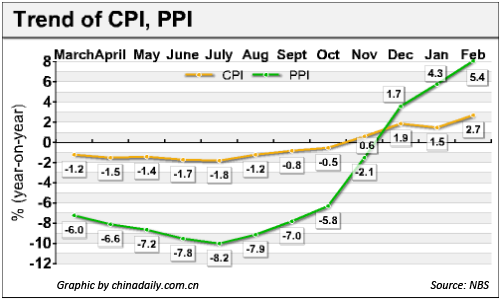InfoGraphic
Key inflation gauge likely to slow down in March
By Wang Xiaotian (China Daily)
Updated: 2010-04-06 10:15
 |
Large Medium Small |
BEIJING: China's consumer price index (CPI), the main measure of inflation, may slow down in March despite the upward pressure from the recent drought in the southwestern regions, analysts and officials said.
In February, the key gauge of inflation rose by a stronger-than-expected 2.7 percent year-on-year from 1.5 percent in January, the fastest clip in 15 months, reinforcing public inflationary expectations and concerns over imminent tightening measures.

The National Development and Reform Commission (NDRC) said March CPI would decrease slightly compared with February, while the average rise of CPI in the first quarter would be between 2 to 2.5 percent.
Based on the NDRC forecast, Qilu Securities analyst Bian Xubao said the chain gain in March compared with the previous month would show a fallback of around 0.3 percentage points to 2.4 percent.
Bian said the effects of the consumption boosting February Spring Festival have started to fade away in March and with the weather becoming warmer, agricultural product-based food prices have also shown a downward trend. All of these would have a bearing on the CPI in March.
Surging food prices, especially vegetable and fruit prices, were cited by the National Bureau of Statistics as the main cause of the steep CPI increase in February.
According to the Ministry of Commerce, the country's commodity market remained steady in March, with monitored agricultural food prices in 36 big and medium-sized cities showing continuous falls for the five weeks.
"Decline in agricultural food prices will bring down the CPI and stabilize the year-on-year numbers for March," said Hu Yuexiao, an analyst at Shanghai Securities, adding that non-food prices will also show seasonal declines during the period.
But many experts expressed concern that lower agricultural yields in the drought-hit region would pressure food prices as government has been forced to transport grain products across the nation to make up for the shortfall in supplies.
Since last autumn, a severe drought has plagued southwest China, and is now spreading to other regions. It has affected about 6.5 million hectares of farmland, more than 20 million people and 12 million heads of livestock.
| ||||
"It has only a negligible effect on rice, rapeseed, sugar, tobacco leaf and tea, and these crops account for very little in the CPI basket," he said, adding the drought area this time is much lesser than that of last year.
Pressure is bigger in terms of inflationary expectations, analysts said.
Liu Yuanchun, vice-director of the School of Economics, Renmin University of China, said the market is very sensitive to regional climate changes and these may compound price rise expectations. The extent of the impact of drought on CPI depends on the central government's capability of handling the situation and controlling grain prices, he said.
Analysts said that China's grain reserves of more than 200 million tons and six consecutive years of good harvest would relieve the pressure from the southwest drought and secure the overall food supply situation.
Still some analysts are not so optimistic. Dong Xian'an, chief macroeconomic analyst at Industrial Securities, said the year-on-year increase in CPI in March would rise to between 2.8 to 3.1 percent as non-food especially housing-related prices have surged since the fourth quarter of last year.













